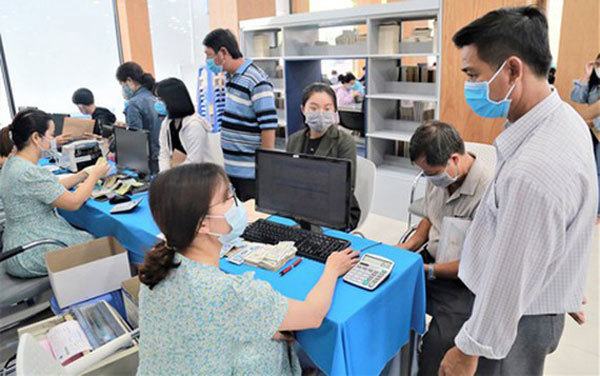This new decree will introduce many ceilings for each specific training type and institution type, most of which will be higher than the current ones.
 |
| New students are paying tuition fee for the academic year of 2020 in HCMC University of Food Industry. |
The final draft of the new decree was supposed to be effective as of this academic year. However, due to certain oppositions from the public, it will be applied in the next school year of 2022-2023 if approved by the Government.
Compared to Decree No.86, this final draft divides tuition fees of public universities into multiple levels instead of only two (financial autonomy and financial non-autonomy).
Accordingly, as to public universities that either do not guarantee regular spending or are able to have regular expenditure but do not pass the quality accreditation for a domestic higher education institute, the tuition fees will be regulated differently for 7 training sectors.
For example, the fee of the first sector (education and teacher training) will increase from VND1.25 million (approx. US$54) a month (in the 2021-2022 academic year) VND2.45 million ($106) a month. In the second sector (arts), the increase is from VND1.2 million (($52) to VND1.93 million ($83) per month. In the medical sector, there are two sub sectors of general healthcare and medical-pharmaceutical training, with a rise to VND3 million ($129) and VND3.94 million ($170) a month, respectively.
Regarding public universities that guarantee regular spending and pass the quality accreditation for a domestic higher education institute or those totally financially autonomous but do not pass the quality accreditation for a domestic higher education institute (level 1 autonomy), the maximum tuition fee will be two times as high as the regulated ceiling fee, a double of the current fee.
This means among the 23 level-1 autonomy universities, the new fee will reach at least VND40 million a year ($1,727).
To level-2 autonomous universities (ensuring regular spending and investment and passing the quality accreditation for a domestic higher education institute), the maximum tuition fee will be 2.5 times as high as the regulated ceiling fee.
To level-3 autonomous universities (fully financially autonomous in spending and investment, with the highest-level quality accreditation for a domestic higher education institute or for an international university), the tuition fee is identified by the university itself based on the economic-technical factors, which are clearly explained in the permitted autonomy plan.
Also self-identified are the tuition fees of any high-quality training programs approved by the Minister of Education and Training and passing the highest-level quality accreditation for a domestic higher education institute or for an international university within 2 years from the first cohort.
The fees of master and doctorate training programs are 1.5 times and 2.5 times as high as the under-graduate ones of the same university respectively.
Obviously, when the new decree comes into effect in 2022, the tuition fee for state-owned higher educational institutions will be at least VND12 million a year ($520). It will reach the minimum of VND19.3 million per year ($830) in 2025.
Autonomous universities that pass the quality accreditation, the fee will be from 2 to 2.5 times as high.
Dr. Hoang Ngoc Vinh from the Consultation Team for the National Committee for Educational Reform in the Period of 2016-2021 explained that university tuition fee must take into account the affordability of the general public and the investment in lecturer salary and quality, educational equipment provision, and curriculum renovation.
Therefore, the community should share financial responsibilities with the Government to maintain training quality.
It is clear that regular spending autonomy among certain higher educational institutions has proved usefulness when the university’s management board becomes more active in seeking resources via conducting practical research, training human resources corresponding to business orders, and receiving sponsors from companies.
Necessarily, each kind of expense and revenue should be publicized to ensure transparency, while finance management should be effective to avoid loss.
At present, the tuition fee for higher education in Vietnam is considered quite low in the region. Therefore, it is impossible both to have global-standard training quality, modern educational equipment, high lecturer salary, and to maintain a low training fee.
On the contrary, with this fee increase, universities are freer to implement new policies, introduce scholarships for the vulnerable, and upgrade their training quality.
The final draft has one new important content related to educational service prices, identified in accordance with the Price Law and the Higher Education Law (effective as of July 1, 2019), as well as guiding documents for implementation
Dr. Vinh shared that the World Bank considers education and training as a part of the service sector. As a result, there should be competitive training prices (taking into account the cost of infrastructure, employee salary, training curriculum and time) among educational institutes for businesses to select. SGGP
Vien Hong

Universities offer assistance to students as tuition fees increase
Universities have developed a variety of assistance programmes to help students access higher education, including loans, scholarships, housing and food aid.

Public universities in HCM City to hike tuition
A number of public universities in HCM City that have been granted financial autonomy are planning to increase tuition in the 2020-21 academic year.